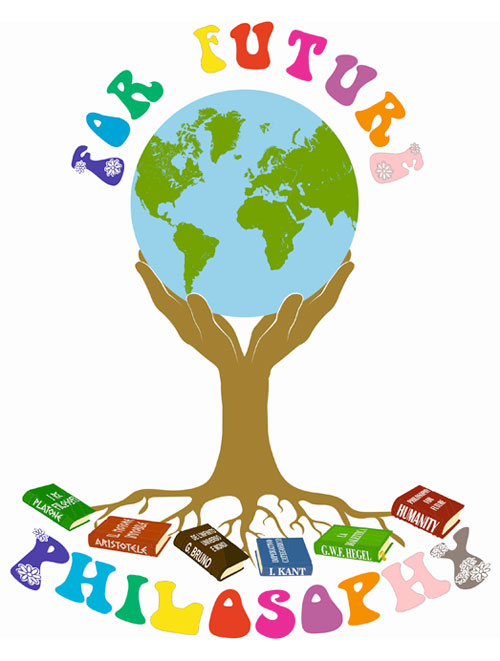
Purpose of a Philosophy for the future (PfF)
The aim of this platform is to scientifically and philosophically support the "Fridays for Future" movement and all future movements that are already active or will be born in order to meet the current environmental crisis and to promote a dignified life for every human being on planet Earth, regardless of where they were born.
Since this crisis is not only due to technological and physical problems, but has its origin in a world view, a view of humans and society, that places the quantitative and materialistic aspect of life above its qualitative and spiritual aspect. Therefore, a purely scientific approach in the sense of the natural sciences is not sufficient to find a solution. What is needed is a genuine philosophical change in the principles that govern human life on planet Earth.
To use the adequate expression coined some time ago by Thomas Kuhn in his now fundamental text "The Structure of Scientific Revolutions", we need a ’paradigm shift’.
The paradigm, the basic principle that nowadays inspires our society on a global scale, is that of growth (economic, technological, demographic, etc.). This paradigm, which has been expanding for at least 250 to 300 years, has undoubtedly made it possible to achieve high levels of prosperity in some regions of the world, but at a very high cost.
Both world wars alone, with their level of death and destruction, are certainly due to the imperialist will of the industrialised societies. War was waged for growth and expansion, only to determine who should dominate and therefore expand and continue to grow.
The world wars were not only caused by dictators, but by greedy national states fighting for world domination to ensure their growth and expansion. It was about determining who was in charge of the world - and today we also know who won and who is in charge.
Only the possibility of the atomic bomb, and thus the uncertainty of victory, has so far prevented a Third World War, which as a latent possibility is always threateningly present. The national states are largely militarised and ready for war, even if, fortunately, the focus currently is on cooperation, albeit it is often uncertain. The ruthless law of oppressing the competitor in a race for growth and expansion still prevails.
But it is not only the human losses of the world wars and the fear that this could happen again that casts a dark shadow on the paradigm of ’growth at all costs’. The environmental crisis now appears to be a threat that is at least equally serious. For the first time in history, humanity is seeing the same forces and resources that secure human life on the planet turning against them.
Finally, crises in various regions irrefutably show that the paradigm, the dogma of growth, had and still has very high costs. Examples are exploitation in child and adult labour without respect for the fundamental rights enshrined in the 1948 Declaration, or deaths from hunger and disease in many regions of the world, while other regions live in wasteful luxury. This luxury, in turn, causes environmental destruction, which often affects the very people who do not benefit from that kind of growth.
The demand for climate justice is rightly being raised today in protests to counter the environmental crisis. However, the problems cannot be solved merely by means that are nevertheless necessary, such as the green economy, but only by turning away from the basic principle of uncontrolled and unlimited growth. This is the source of all the problems humanity has experienced in the last two or three centuries. To think that solving the problem without changing the principle that is the cause is a mere illusion and can only serve to soothe the conscience.
In fact, solving the problems of human life on earth is not a purely economic or technological problem that can be solved by changing the way of production, but a philosophical problem. Not understanding this and moving forward like nothing had happened, acting like the historical moment of the ’paradigm shift’ had not come, is only wasting more precious time. This could then prove fatal for an effective solution to environmental problems.
The British historian and politician Arnold Joseph Toynbee was already aware of this, and as early as 1976 he wrote in one of his most important works, "The Tale of Man":
"In the last two centuries, humanity has increased its material power to such an extent that it has become a threat to the survival of the biosphere. But he has not developed his spiritual possibilities simultaneously; on the contrary, the gap between these and his material power has widened accordingly. This discrepancy is a cause for concern because a development of humanity’s spiritual potential is the only conceivable change in the constitution of the biosphere that can protect the biosphere itself and humans from destruction by a greed that today is endowed with the power necessary to defeat its own goals".
(from: Humanity and Mother Earth. The History of Great Civilizations, p. )
Toynbee also pointed out that the goal of the "development of man’s spiritual potential" should aim at:
"The current global set of local sovereign states is not capable of maintaining peace, nor is it capable of protecting the biosphere from pollution by humans or preserving its irreconcilable natural resources. At the political level, universal anarchy can no longer exist in an ecumenical world that has already been transformed into unity on a technological and economic level. What has proved indispensable over the last 5,000 years, and what has proved feasible over the last 100 years at the technological level but not yet at the political level, is the creation of a universal political body composed of cells the size of Neolithic village communities - a dimension in which the members can get to know each other personally and at the same time each of them can also be citizens of a world state". (ibid. p. ).
Only with a new philosophical approach, a new view of humanity and society, and thus with a new paradigm, we can counter the environmental crisis, which is not a crisis of nature, but a crisis of humans and their relation to nature.
It is not a question of renouncing growth and opting for "happy de-growth", even if this certainly has good reasons, as Serge Latouche has suggested. It is rather about humanity viewing growth from a qualitative perspective and no longer just from a quantitative perspective; from a philosophical-social perspective and no longer just from an economic-individual perspective. In essence, we must question ourselves and question not only the limits but also, and above all, the importance of growth.
What is the use of disproportionate growth, which only one part of humanity enjoys, while the other part lives under avoidably bad conditions of poverty, scarcity and death?
What is the point of growth if the rich countries, through their greed for luxury and waste, ruin the nature of those countries that would instead be content with a frugal life in harmony with nature? What is the point of growth if then the natural conditions are impaired and the quality and quantity of human life decreases everywhere, including in the rich countries themselves?
There can be no real, serious, human and rational future without a profound philosophical reflection that addresses these questions and finds logical, rational and valid answers for the whole of humanity, not just for those in positions of responsibility.
Humanity must take its destiny into its own hands, as Toynbee has well described it, at a global rather than a national level. The whole of humanity has to do this because national responses are inadequate and not sufficient. We have become a globally networked society in a country that is now "the global village" (McLuhan) - a unity of fact, though not yet of law. This is the dimension of human life on planet Earth in the third millennium and according to this dimension we have to think and act.
This platform wants to offer a space for thinking and philosophical reflection on growth and thus on the future and destiny of humanity. Scientists, philosophers, politicians etc. who have shown sensitivity and understanding for this topic in their research and professional activities are invited to participate. Certainly, no one alone can have the complete recipe, but from many individual and partial recipes this vision, this new paradigm, which illuminates the future course of humanity, can emerge. The platform should give these researchers a space where they have the opportunity to present their ideas to a wider audience.
Such an audience should consist of the activists of movements such as Fridays-for-Future, which are active worldwide for environment, justice, peace, etc., but often do not have the necessary philosophical and scientific knowledge.
The platform should therefore serve as an interface between scientists and activists. It is interactive, i.e. activists can get in contact with researchers, ask questions etc. - similar to other social media channels, except that this is a philosophical, scientific space. Science should get in conversation with activism. They need each other. Scientists wants to (and have to, it is their duty) influence the development of the world, whilst activists want to participate in the development of the world as well, but do not always know exactly how.
The platform should therefore enable communication and mediation between both sides, between scientists and activists: Science (the rational, the head) reaches the activists (the real, the hand), according to Hegel’s basic idea that what is real is the rational, and what is rational is real.
"What is reasonable is real; and what is real is reasonable." (or. „Was vernünftig ist, das ist wirklich; und was wirklich ist, das ist vernünftig.“).
(G.W.F. Hegel, Grundlinien der Philosophie des Rechts, Frankfurt am Main 1972, p. 11, first edition Berlin 1821).
Today this is principle is not yet realised, since politicians and leaders in economy do not represent what is reasonable but their own power interests. This has to change rapidly if we want to have a different environmental policy as well as justice and peace policy: A philosophical platform can be very supportive, maybe even decisive!
This new course to the future needs to be strongly desired and courageously pursued by those who feel the need to take to the streets on fridays, today and tomorrow. This is very important in order to show the whole world, and above all those who run world politics, that there is a clear conscience and a firm will to not allow the undisputed dogma of growth to cause more victims and other natural disasters until there is no turning back. This is something that people who think rationally, that is, philosophically, should not allow!
The future belongs to all humans and not only to those who took the lead after the last wars. A "Philosophy for the future", which we - intellectuals and activists - will work out together here, should support us in this certainly difficult but very urgent and above all unavoidable historical task.
(Marco de Angelis, 1 January 2020)
Your comments
This page has no comments yet
Submit your comment
This blog encourages comments, and if you have thoughts or questions about any of the posts here, I hope you will add your comments.
In order to prevent spam and inappropriate content, all comments are moderated by the blog Administrator.
Access your Dashboard
Did you forget your password?
Did you forget your password? Ask for it! Click here
Create an account
Not yet registered? Sign up now! Click here


